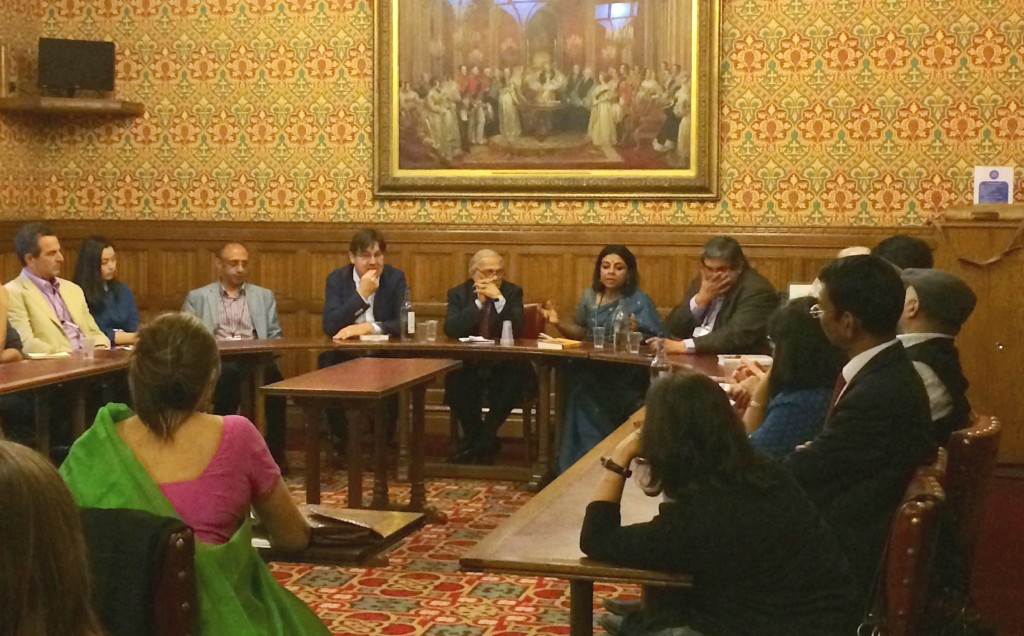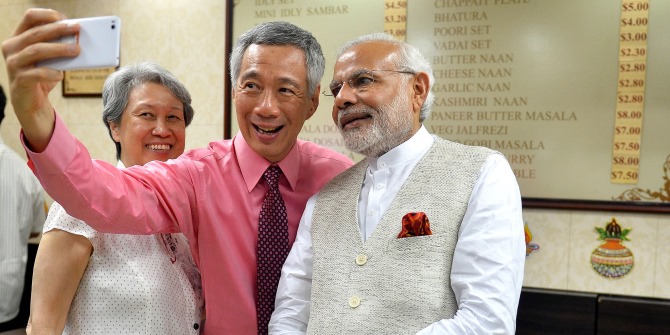Last Wednesday Why India Votes? a book by Mukulika Banerjee, Associate Professor of Anthropology at the LSE, was launched at the House of Lords. The panel featured Jonathan Spencer, Regius Professor of South Asian Language, Culture and Society at Edinburgh University, Salil Tripathi, journalist and Director of policy at the Institute of Human Rights & Business, and Dr Banerjee herself. The event was hosted and chaired by Lord Bikhu Parekh. Sonali Campion reports.
Why India Votes? explores the motivations of ordinary voters across India through detailed local ethnographic research. The evening featured a lively panel presentation, which explored the value of anthropology as a way of understanding elections. Professor Spencer illustrated this by recounting his own recent experience of voting in the European elections in Edinburgh. He talked of arriving at his polling station to find an old friend standing outside campaigning for the NO2EU party, or “doggedly handing out leaflets for a lost cause” as Spencer put it. He emphasised that this kind of commitment is part of the beauty of elections and that anthropologists offer a unique and important insight into why someone will devote a day to promoting a party that will inevitably come last or, in the case of Banerjee’s book, why the Indian electorate votes enthusiastically and en masse despite the fact each individual vote counts for so little.

Salil Tripathi drew attention to the fact the launch event coincided with the 39th anniversary of the declaration of Emergency Government in India. 25th June 1975 marked the beginning of almost 2 years during which Indira Gandhi’s Congress government clamped down on democracy by arresting scores of political opponents and journalists. But Tripathi used the episode to highlight the extent to which India has consolidated its democracy – the Emergency was eventually ended by democratic elections in 1977. It has been seen on many occasions since that problems are addressed in a predominantly peaceful manner, precisely because the Indian voter continues to feel he or she can exercise real power on voting day and so is able to participate in regular “silent revolutions”. Tripathi suggested that the West often adopted a patronising attitude in relation to Indian democracy but books like Why India Votes? serve to demonstrate what can be learned from India.
Dr Banerjee discussed the questions that were explored in the book. For her, Indian elections pose a puzzle, not due to their size but due to the enthusiasm with which the population participates. But she pointed out that if you want to understand the motivations behind participation, “why do you vote?” is the last question that should be asked. The person who turns up at the polling station on voting day is shaped by so many wider issues, many of which are non-political.
The book is based on field research conducted in 11 different sites across India during the 2009 Lok Sabha elections. Researchers looked not just at what happened on polling day, but also at how the political campaigns were received and discussed ahead of time. Banerjee described Indian election campaigns as being akin to carnivals: roles are reversed as the powerful beg for votes, their crisply starched outfits increasingly crumpled by the rough and tumble of the campaign trail. And yet no-one mistakes the temporary nature of this switch. When the campaign ends and the votes are counted, normality does return. In the Q&A session it was acknowledged that this institutionalised restraint (linked to Edward Shils notion of “the virtue of civility”) in the wake of elections plays an important role in the stability of Indian democracy.
Dr Banerjee concluded both her book and the panel session with the observation that elections are considered meaningful by a large number of Indians in part because they believe it is better to have a say over their choice of leaders than to be left with an autocrat, but also because they value the act of voting itself. For some of the most socially marginalised this can be a case of personal validation – referred to in the discussion as “bureaucratic existentialism” i.e. “I am on an official list therefore I exist”. For others it can be the sense of equality derived from knowing each individual vote is worth the same as the next, regardless of the caste, class or religion of the voter. Banerjee indicated that this conclusion – that the act was as important as the outcome – was confirmed in this year’s election with the introduction of a “None Of The Above” (NOTA) option on the electronic voting machines. Voters embraced the innovation (in some places the number of NOTA votes was higher than the margin between the winner and the runner-up) demonstrating that people wanted to vote regardless of whether they liked the candidates.
The panel presentation sparked a wide range of insightful questions from the audience. Sir David Butler raised the topic of India’s pioneering use of electronic voting machines and the impact they have had. Another member of the audience made a comparison with South Africa, commenting that although citizens vote regularly, they tend to vote “tribally” and for the same politicians each time and questioning whether this was the case in India. The panel responded that although there are still significant correlations between caste and/or class and voting patterns there are also innumerable cases where groups vote in a manner that might be considered counter-intuitive. Language was also discussed. Banerjee suggested that looking at the words used in discussions of politics was an illuminating way of getting an insight into India conceptions of democracy. For example, the word matdan – normally translated as “vote” in Bengali/Hindi – is composed of two words: mat – which can be translated as “mind” or “opinion” and dan which literally means “to give without expectation of receiving”. The point was made that political science and discussions of democracy are so often shaped by Western Liberal ideas. The anthropological approach and its attention to language was therefore welcomed as offering a refreshing new and illuminating perspective.
Why India Votes? published by Routledge India is available now.
About the Author
Sonali Campion is Editor of the India At LSE blog.






